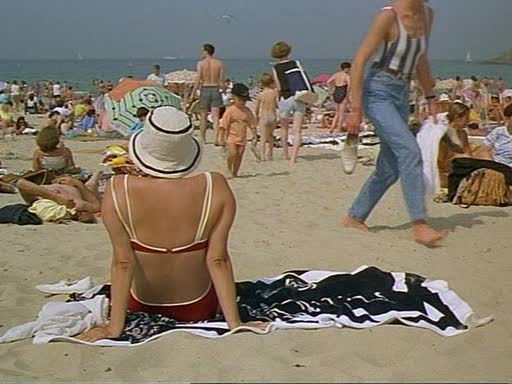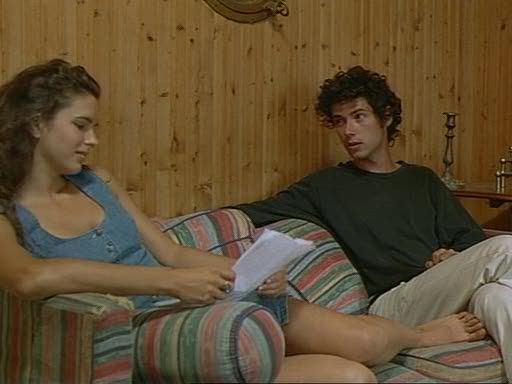
If there's a single season I associate most intimately with Eric Rohmer, it is definitely the summer. Many of his best films are not only set in the summer but treat the concept of this sunshine-filled vacation season as a thematic subtext, a subject unto itself. Pauline at the Beach, Claire's Knee, The Green Ray (whose alternate title was simply Summer), and La Collectionneuse all deal with the multiple resonances of the summer holidays: as a time for self-examination, new beginnings, new bonds, and quite often a "holiday" of sorts from the ordinary moral, sexual, relational, and identity obligations of the films' characters. These films conceive of vacations not just as geographical displacements, but affective, emotional, and intellectual ones as well. For Rohmer, the summer holds the potential to introduce great change, and yet conversely there is an ephemeral quality to everything that happens during this season, as though all these changes might be fleeting, forgotten by autumn. Moreover, one primary source of the oft-overlooked sensual pleasures of Rohmer's films is the appreciation of the natural world and its relationship to the film's characters, and a summertime setting has frequently provided the filmmaker with some of his most beautiful imagery. Even the second film in Rohmer's "Four Seasons" cycle, A Winter's Tale, opens with one of the most sumptuous, emotionally moving evocations of summer romance on film.
Naturally, the third film in the seasonal quartet, A Summer's Tale, picks up on the themes of self-examination and renewal that run through so many of Rohmer's most summery films. The film follows the adventures of Gaspard (Melvil Poupaud), an earnest but perpetually uncommitted young man spending his vacation at a friend's beachside home. He is, at least ostensibly, waiting for the arrival of his girlfriend Lena (Aurelia Nolin), with whom he has an ambiguous on/off relationship, and for whom he nurses a cooling but never quite extinguished devotion. She has halfheartedly promised to meet him here, and as a result he is only half-expecting her to show up; he's not surprised or even too disappointed when the weeks go by with no sign of her. In the meantime, this period of inactivity leads into similarly ambiguous relationships with two other girls. Margot (Amanda Langlet) is also waiting for a distant boyfriend she's not sure she loves, and she becomes close friends with Gaspard rather quickly; there is a constant hint of attraction between these two flirty but relatively chaste friends, a suggestion that they could be more if either pushed their subtle flirtation just a little further than usual. The second girl is Solene (Gwenaëlle Simon), who's passionate, sexy, and spirited; she instantly attracts Gaspard in a visceral way. Gaspard spends his summer essentially torn between three women, two of them attractive, fun and obviously fond of him, and a third who is absent for the bulk of the film, and who when she finally arrives is tyrannical, moody, and inconstant; nevertheless, she is the one who consumes most of Gaspard's thoughts.
Rohmer structures the film around Gaspard and his women, adopting a loose three-part structure in which the young man spends time with each of the women in turn, revealing different aspects of his personality with each. His friendship with Margot is characterized by thoughtful, meandering conversation. They take long walks together, enjoying some playful repartee and trading stories as they wander along the beach and its surrounding paths. With Solene, Gaspard takes on more of a lustful, erotic sensibility, caressing her long tanned legs and eying her body with obvious admiration. His interest in her is more sensual than intellectual, though she does share his passion for music and enjoys singing a sea shanty that he originally wrote for the absent Lena to sing. Lena herself, though her presence hangs over the entire film — first signaled by a photograph, one of Rohmer's favorite markers of absence — is onscreen for a relatively short time towards the end of the film. With her, Gaspard becomes clingy and reactive, his behavior reflecting her shifting moods. One day, she greets him cheerfully and the reunited couple walks along the beach with their arms wrapped comfortably around one another, but the next day she insults him and says she doesn't want him to touch her.

Rohmer's structural interest in this tripartite story extends to the use of music. The idea of sailing and of seafarers' songs runs throughout the film, and each segment features a scene in which one of Gaspard's women sings one of these songs with him. With Margot, he sings in the car while driving to see a sailor who knows a lot about local folk music. Later, Gaspard gives Solene the sea shanty he wrote, about a pirate's daughter, and accompanies her on the guitar while she sings it; they reprise the song again on a boat with Solene's uncle and some friends, with an accordion accompaniment this time. Finally, when Gaspard is reunited with Lena, she sings him a song whose lyrics ironically comment on the summer he spent before her arrival, though she doesn't realize it: the song is a wistful lament upon leaving a girl named Margot, and incorporates the names of many local towns. The differences between these three performances indicate the differences between the girls and their relationships to the lead. Margot and Gaspard sing without artifice, out of tune and casually, just belting out a few snatches of lyrics as a lark while driving. It's less spontaneous with Solene, who carefully prepares before singing the tune, though in her more refined way she is also a passionate singer. In the later scene where they perform the song on her uncle's boat, she practically becomes the pirate's daughter, forcefully shouting over the howl of the wind, as she sways with the waves, her hair blowing majestically behind her. Lena's song, too, reflects her relationship to Gaspard: superficial, without getting at deeper significances. The song's lyrics make her want to visit one of the islands that's mentioned, but it's clear from Gaspard's stuttering reaction that the words about Margot affect him more than he ever lets on.
Rohmer often gets at emotional reactions in this indirect fashion. His characters talk and talk, frequently about their emotions and what they want, but it remains necessary to read between the lines, to pick up subtle cues, to understand that what they say they want is not necessarily what they actually want. The form of this film, as with many of Rohmer's films, is technically a romantic comedy, albeit a particularly straight-faced one; there are plenty of moments that elicit a smile, but Rohmer could rarely be described as outright funny. What sets his romances apart is that he represents relationships with no hint of movie conventions. His films have an instinctive realism, an ear for the way real people talk and interact, and a knack for drawing multi-layered and always appealing performances out of his cast. This is not a film where one is rooting for two people to get together against all odds — indeed, at many points most people probably wouldn't be rooting for Gaspard at all, since he can be an arrogant, self-centered jerk, stringing along three women because of his own insecurity. He's essentially hedging his bets throughout the film, setting up substitutes and surrogates for the missing Lena; and even when she arrives, not letting go of his contingency plans lest she should back out. Gaspard's self-created predicament, juggling three women who have varying degrees of commitment and affection for him, is amusing, but most of the film's sympathy actually lies with the women, especially Solene and Margot. They are very different but each is charming and intelligent, and as usual Rohmer proves magical at getting rich, vibrant performances from his actresses. Even Lena, who might be the villainess at times, is fleshed out, given a chance to verbalize her stubborn, arrogant streak and explain her sometimes exasperating behavior.
Rohmer excels at this kind of complex characterization. There is no traditional romantic arc here, and Gaspard's summer ends without a resolution to any of these potential relationships, other than one final mournful return of the song bidding farewell to Margot, which emerges on the soundtrack as Gaspard's boat pulls away at the end of the season. This film is a simple, supple pleasure, a celebration of youth, beauty, and the fickleness of love and affection.
I haven't seen this, but your review is evocative. This especially rings true:
ReplyDelete"Rohmer often gets at emotional reactions in this indirect fashion. His characters talk and talk, frequently about their emotions and what they want, but it remains necessary to read between the lines, to pick up subtle cues, to understand that what they say they want is not necessarily what they actually want."
Nicely done.
"Moreover, one primary source of the oft-overlooked sensual pleasures of Rohmer's films is the appreciation of the natural world and its relationship to the film's characters"
ReplyDeleteWell stated. Where more conventional directors use background music to set mood, Rohmer will frequently employ elements of the natural world, such as the sound of trees rustling in the wind.
Rohmer's 4 aventures de Reinette et Mirabelle also employs a marvelous, evocative summer-vibe at the beinning.